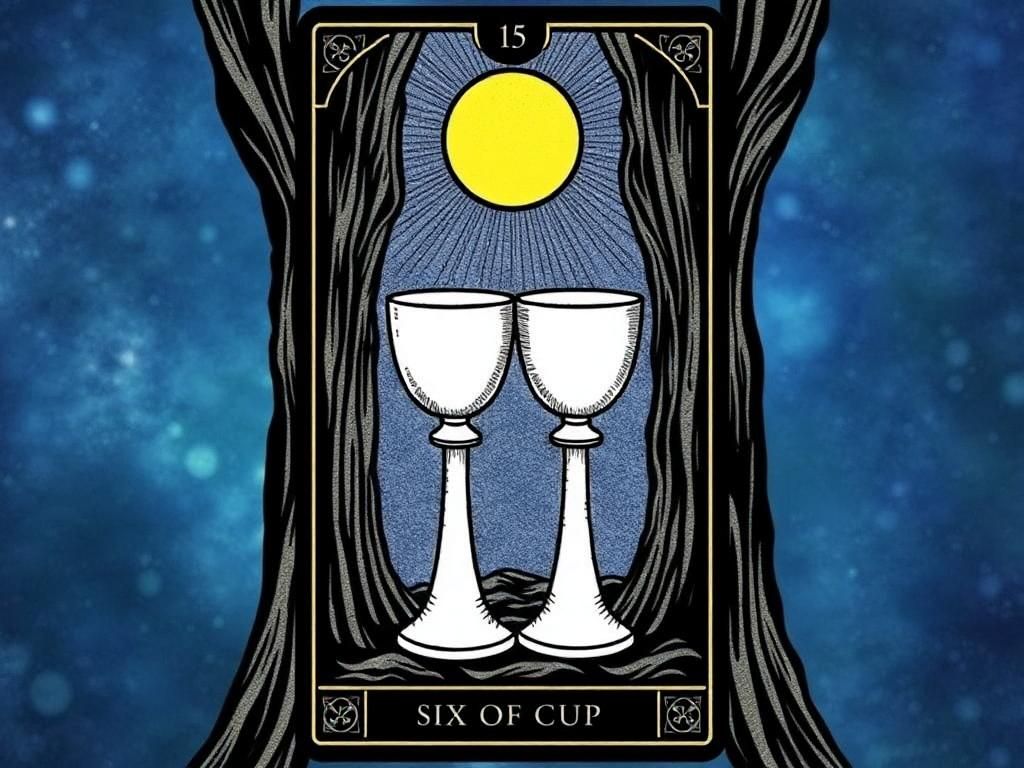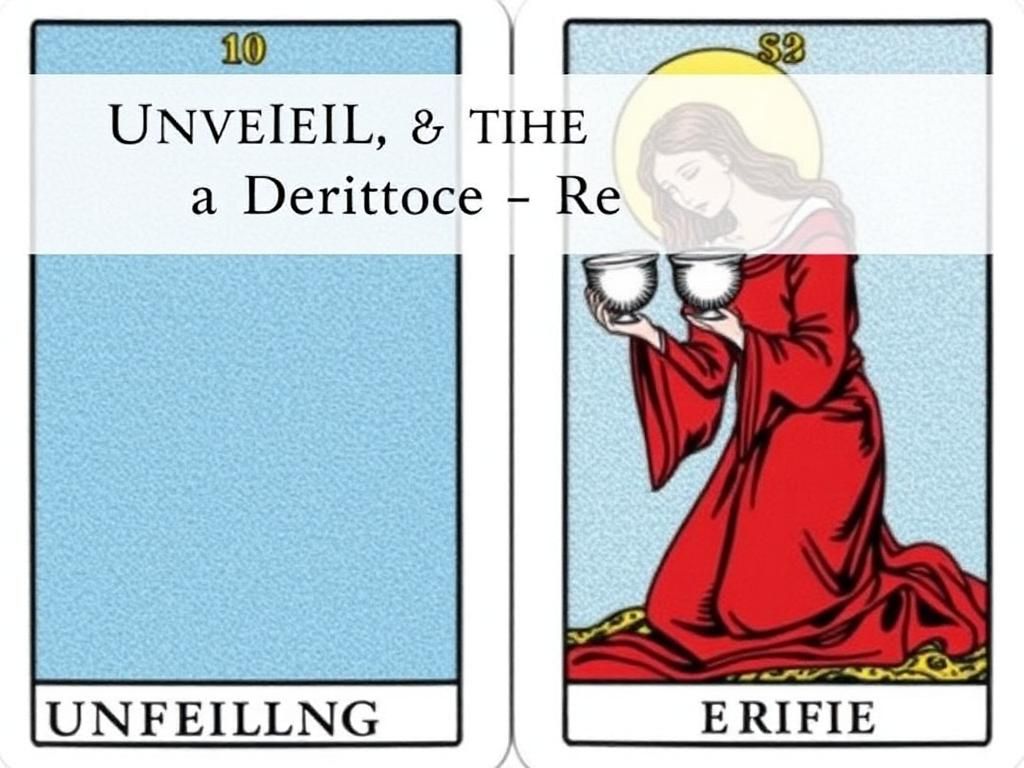Understanding Tarot card meanings is fundamental to both novices and seasoned practitioners in the mystical world of Tarot. Each card carries its unique energy and symbolism, and among them, the Six of Cups occupies a special place. This card, often associated with nostalgia and childhood memories, unfolds layers of meaning that significantly shift when drawn in the reversed position. The reversed Six of Cups challenges us to confront unresolved issues and move forward, making it a crucial card in readings focused on healing and personal growth.
Understanding the Six of Cups
Historical Background
The origins of Tarot are steeped in mystery, tracing back to the 15th century in Europe. The Six of Cups finds its roots in these early decks, which depicted a sense of nostalgia and a connection to the past. Over the years, various Tarot decks—like the Rider-Waite and the Marseille—have evolved the imagery of this card, often portraying children sharing cups, symbolizing innocence and joy. This evolution demonstrates how the Six of Cups has consistently highlighted themes of memory, emotions, and the importance of looking back.
Standard Meaning of the Six of Cups
When upright, the Six of Cups embodies themes of nostalgia, innocence, and childhood joy. It encourages individuals to reflect on their past, recognizing the beauty of shared experiences. Central to its message is the concept of giving and receiving, suggesting the importance of generosity and support among loved ones. However, it also reminds us that the burdens of past experiences can shadow the present, urging us to appreciate how these moments shape our current realities.
The Reversed Position of the Six of Cups
General Interpretation
The reversed Six of Cups signifies a poignant shift in perception—transforming positive nostalgia into a state of negative reflection. This position often carries connotations of immaturity, revealing a difficulty in letting go of the past. It can also suggest a rejection of past influences, which may lead to conflicts or hinder personal growth. A deep dive into its meaning unveils layers of emotional complexities and practical implications.
Emotional Implications
Drawing the Six of Cups Reversed can signify suppressed emotions and unresolved issues that weigh heavily on the heart. Individuals may find themselves struggling to move forward, held back by the emotional baggage they carry. This card can also indicate a tendency toward escapism or regression, as one may cling to comforting memories rather than acknowledge and process painful ones. Thus, it becomes essential for those who draw this card to confront their past honestly.
Key Themes in the Six of Cups Reversed
Past Trauma and Healing
The Six of Cups Reversed encourages a close examination of past trauma and its impact on current life. Individuals may find themselves revisiting painful memories, often resisting the healing processes that can free them from these emotional chains. To fully heal, however, confronting and processing these memories is paramount. Acknowledging the past enables individuals to navigate forward with clarity and resilience.

Relationships and Interpersonal Dynamics
In the realm of relationships, the Six of Cups Reversed can illuminate strained dynamics caused by unresolved issues. Dependency and clinginess may manifest in close relationships, reflecting difficulties stemming from childhood experiences. This card urges individuals to examine how these past influences shape present interactions, promoting healthier engagement with loved ones.
Personal Growth and Development
The hindrances to personal growth caused by nostalgia become starkly clear with the Six of Cups Reversed. It emphasizes the necessity of breaking free from past patterns that trap individuals in cycles of longing. Self-awareness and maturity emerge as fundamental tools for navigating life’s challenges. Embracing change and allowing oneself to transcend former limitations is crucial for continued development.
Practical Applications of the Six of Cups Reversed
In Personal Reflection
For those drawing the Six of Cups Reversed, personal reflection can unearth significant insights. Techniques like introspection and self-evaluation help illuminate buried emotions. Journaling prompts, such as “What childhood memories resonate with me?” or “What unresolved issues from my past affect my present?” can be beneficial tools. Strategies for confronting and processing past experiences enhance emotional awareness and support healing.
In Relationships
Communication becomes vital when navigating relationships impacted by the Six of Cups Reversed. Engaging in open discussions about unresolved issues fosters understanding and healing. Setting boundaries is equally important, ensuring past influences do not adversely affect current connections. Building healthy relationships necessitates an effort to leave emotional baggage behind, promoting healthier interactions devoid of past sentiments.
Tarot Reading Contexts
When the Six of Cups Reversed Appears
The appearance of the Six of Cups Reversed often signals critical moments in readings. It may emerge during reflections on personal history or discussions of emotional and relational challenges. Its meaning can also shift based on surrounding cards, demonstrating how context shapes interpretation. For instance, it may indicate a need for healing when paired with cards representing introspection.
Advice from the Six of Cups Reversed

Among the wisdom of the Six of Cups Reversed lies guidance on moving forward and embracing change. Individuals may find encouragement to break free from cycles dictated by nostalgia. The card suggests focusing on the present and cultivating a future free from the shadows of the past. By doing so, one taps into the transformative power of personal growth.
Conclusion
In summary, engaging with the Six of Cups Reversed opens a pathway toward understanding unresolved issues and personal growth. Accepting one’s past is vital for growth, fostering opportunities for healing and transformation. Embracing the lessons this card brings allows individuals to reclaim their narratives, leading to a brighter future.
Additional Resources
For those keen on diving deeper into the mysteries of Tarot, consider exploring recommended books such as “The Tarot Bible” and “Seventy-Eight Degrees of Wisdom” for enriching insights. Online Tarot communities and forums like Aeclectic Tarot are excellent for sharing experiences and learning from others. Additionally, documentaries exploring Tarot’s significance enrich understanding and appreciation for the cards.
Frequently Asked Questions
Can the Six of Cups Reversed indicate a positive outcome?
While primarily illustrating challenges, the Six of Cups Reversed can also signal a turning point, prompting necessary changes that lead to growth and positive outcomes.
How can I use the reversed Six of Cups in self-improvement?
Drawing the Six of Cups Reversed invites self-reflection, encouraging you to confront past experiences and emotions that may impede growth. Engaging in journaling and introspection can foster a deeper understanding.
What other tarot cards complement the interpretation of the Six of Cups Reversed?
Tarot cards such as the Eight of Cups, which signifies letting go, or the Hermit, representing introspection, can enhance the understanding of the Six of Cups Reversed, emphasizing the journey toward healing.
What are some techniques to cope with unresolved issues highlighted by the Six of Cups Reversed?
Techniques include guided journaling, therapy, meditation, and visualizations focused on healing and releasing past traumas.
Is it possible to turn the lessons from the Six of Cups Reversed into strengths?
Absolutely! By facing and processing past challenges, individuals can use their experiences as strengths, fostering resilience and self-awareness moving forward.
How can I effectively communicate about unresolved issues in my relationships?
Use “I” statements to express feelings without assigning blame. Aim for an open, honest conversation focused on understanding rather than confrontation.
What actions can I take to embrace the positive aspects of the Six of Cups?
Focus on gratitude for past experiences but learn to release those that hinder your current path. Engage in practices that cultivate a connection with the present while honoring your past.
Are there specific journaling prompts I can use when reflecting on the Six of Cups Reversed?
Yes! Consider prompts such as: “What memories do I find myself clinging to?”, “How do past experiences shape my current relationships?”, or “What am I afraid to let go of from my past?”
Can the Six of Cups Reversed influence my career decisions?
Yes, it may indicate that unresolved past issues could be impacting your professional life. It’s a prompt to evaluate how your history influences current career decisions and relationships within workspaces.
| Theme | Description | Potential Impact |
|---|---|---|
| Past Trauma | Revisiting painful memories that require healing. | Struggles with emotional baggage affecting present life. |
| Relationships | Strain caused by unresolved issues and dependency. | Challenges in maintaining healthy interactions. |
| Personal Growth | Hindrances due to nostalgia and past patterns. | Necessity of cultivating self-awareness and maturity. |
